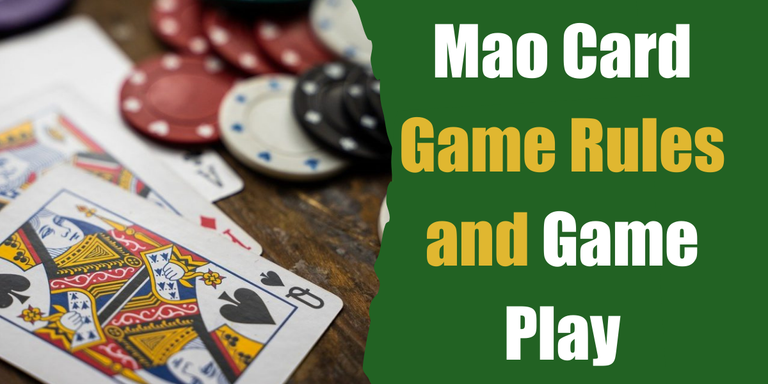Rules of Mao - Part 3

The end
The next group of speech related rules are more regional speech rules, or rules added to later games;
Questions. In some variants, all players (sometimes including the dealer) are prohibited from asking any questions. Others require that all speech be in the form of a question. Speech rules that require certain phrases are naturally exempt. Some variants that do not generally speaking but that do prohibit questions will nonetheless permit a player to make a statement not in the form of a question, but inviting a response. Thus, although asking "What time is it?" would be a violation, stating "I do not know what time it is, and I wish someone would tell me" would be permitted.
Special card names. In some variants, specific cards are given a name that is to be said instead of the real name of the card. For example, if Bob plays the nine of diamond or a joker, he might say, "that's the badger!" Praise Jesus. Some variants require a player to say or yell "Praise Jesus" when three 6's are played in subsequent order. Other variants require the player who played the final six in a triad to say "Hail Satan", or "Hail the Father of Lies" etc.
No Mao. Some variants will penalize players for saying "Mao" during game play, often severely.Though usually just a 2 card penalty, a penalty of 30 or 50 cards is not unheard of, making the rule hard to forget after the first offense.
Alternatively, this may only apply for the last card a player discards. There is usually a time limit of approximately 5 to 10 seconds for each turn. If exceeded, the player gets a penalty card for 'delay of game' or 'late play' and either loses his turn or gets another penalty every five seconds thereafter to either comply with any violated rules, or play a card. Ruthless players who are familiar with the rules sometimes exploit this rule to confuse new players who are unfamiliar with game mechanics that change the order of play: for example, ruthless players might look expectantly at a particular player other than the one whose turn it is as if waiting for him to play, then penalizing that player for "Playing out of turn" if he plays, then immediately penalizing the player whose turn it actually is for "Delay of game". For each penalty, unless the rules have been changed appropriately, the penalty card is given with the declaration of the rule violated.
Most times a penalty is called, one card is given to the offender. If the call was wrong, the caller of a penalty can be given the card back with a reason of "bad call" or "frivolous card-giving", although it is not uncommon for that player to simply get the card returned to them for "talking." For example, if a player plays an ace of spades and does not declare the spade within an appropriate amount of time, a player may give them a card, saying "Failure to declare 'ace of spades.'" If after another appropriate amount of time they simply stare blankly at you, they are given another card perhaps saying "Continued failure to declare 'ace of spades.'" This may continue indefinitely, until finally they say "Ace of Spades".
Adding Rules As noted above, in many variants an additional rule is silently and secretly added to the game with each round. It is customary for a player (often the winner of the previous round, sometimes the next person to deal) to add one new rule to the game. There may also be additional rules that are already in effect at the beginning of the game, just to get things moving, and these rules may be known to all players, or perhaps only to the dealer. After many rounds,
many new rules will accumulate. Naturally, only the person who created the rule will initially know what it is. The rules will vary from group to group, and from game to game, but most rules fall under one of the following four categories.
When happens, perform an action (say a phrase, knock on the table, etc)
When happens, something about the game changes
An action must always, or must never, be performed (don't straighten the pile, etc)
Something fundamental about the game changes (a king is treated as if it were a jack for all game purposes.)Note that the listed above can be absolutely anything. Common examples include playing a specific card ("the ace of spades") or a specific type of card ("any red three"), but triggering conditions can become as complicated as their creator wishes. Further examples might include "when someone plays a face card on top of a non-face card", "when someone plays a nine with their right hand" or "playing an odd numbered card on top of an even numbered card".
To create a rule, one could pick a triggering condition, and then an action and/or game effect. The spirit of the rule is generally something in good fun: while rules that unfairly sway the game in favor of one player or to the detriment of one specific player are quite easy to concoct, ("Every time James plays a ten, he gets a penalty of 10 cards",) they are also generally frowned upon as unsportsmanlike. Also, in some variants, after a person goes out, they may then at any point silently deal themselves back in and introduce a new rule
